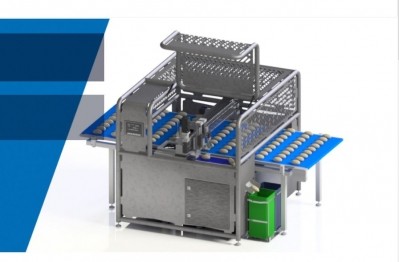Oven-ready strategy

The impact of COVID-19 has forced bakers to refocus on optimising processing and equipment to keep flexible, efficient and cost-effective in an unpredictable market, while continuing to tackle wider healthy eating trends.
There’s a lot to play for in a category worth £3.9bn in retail sales, handling a total volume of just under 4bn units a year according to data from the Federation of Bakers. That’s the equivalent of almost 11 million loaves and packs sold every day.
Larger baking companies produce 80% of bread sold in the UK, in-store bakeries within supermarkets produce 17% and high street shops such as craft bakers produce the rest, according to Gira.
The coronavirus pandemic put bakers under immense pressure as shopper stockpiling triggered by the initial national lockdown fuelled demand for bread and bakery products. And the signs are demand will remain higher than normal, especially in the run-up to Christmas.
Fatherson Bakery – winner of the Small Bakery Manufacturing Company of the Year at the 2020 Food Manufacture Excellence Awards – is one medium-sized supplier wrestling with the huge changes occurring since the year began.
Artisanal quality at scale
The company produces 70 lines, ranging from loaf cakes, traditional sponges and cupcakes and traybakes. Managing director Laurence Smith says one of the toughest issues it faces is manufacturing artisanal quality products on a large scale to satisfy consumers who want to have their cake and eat it.
Fatherson’s factory in Alcester, Warwickshire operates 24/7, with baking taking place overnight and next-day deliveries to customers.
“The challenge is making handmade and hand-decorated efficiently at volume because we supply a lot of major retailers such as the Co-op, Spar, Budgens and Londis,” Smith says. “We are the biggest supplier to the garden centre market with Dobbies, Hilliers and Squires along with farms shops, independents and we are a regional supplier for Morrisons.
“We are an artisan bakery producing millions of cakes a year. You have to have the consistency and the efficiency.”
Alison Ordonez, director of innovation at Roberts Bakery, another supplier in a similar place to Fathersons in terms of aspiring to mass production with an artisanal feel, says: “Consumers are demanding more individual, different and unique innovation that looks and tastes less manufactured and is appropriately priced to encourage them to trial it. As a result, NPD lifecycle becomes shorter, which increases the risk of capital not returning on the investment.”
In order to address this problem, Ordonez says it’s essential to future-proof processing machinery designs, maximising investment by ensuring equipment needs minimal upgrading, so it can support and complement future business innovation.
Ordonez says investment in processing is unavoidable because of the intense pressure on cost due to fierce competition for consumer spend. “We expect this to further increase as we feel the continuing impact of the pandemic on job security.”
Resisting robotics
Smith admits while Fatherson has resisted the attraction of robotics and automation, prudent investment in equipment has helped it become more efficient and flexible, enabling it to react swiftly to shifting demands.
For example, the company has two members of staff responsible for producing more than 100,000 fruit pies a year, rolling out pastry, filling it and cutting around the pie. It has just introduced a pastry roller, allowing these employees to focus on the quality of crimping and filling.
Similarly, it has invested in a doughnut jam filler, avoiding the need for piping bags while ensuring every product has the same amount of filling.
Inevitably, spend on ovens has been one of the latest areas of focus, says Smith. “We have set up a range of different sized ovens which gives us a lot of flexibility for smaller batches of certain products.”
“More efficient and slightly larger ovens help as you can get better and larger batch sizes out that can increase capacity.”
That’s why the company is about to install a new larger oven, improving consistency, quality and capacity for some of its higher volume lines.
Ice cold logic that turns up the heat on the competition
Montana Bakery, owned by the Oetker Gruppe, has completed a 2,400m2 expansion of its bakery in Slough to meet the growing demand for its specialist bakery products.
The main focus of the project was the integration of two new lines into the main bakery to provide additional production facilities for Montana’s stone baked pizza bases and baguettes.
As part of the bakery upgrade, a new spiral freezer, capable of processing 950 kg of product per hour, was installed into the existing bakery structure. Montana Bakery said that the size and scale of the freezer required some complex structural modifications to enable it to fit within the bakery.
Montana Bakery said that it used Pentadel Project Management to oversee the design and deliver the expansion and installation project, which took five months to complete.
Jonathan Mellows, managing director, Montana Bakery said: “It was a complex project that required careful planning and execution so that they could construct around our existing operations. With Pentadel’s innovative and thorough approach we now have a bakery facility that fits our business growth potential for the longer term.”
Montana Bakery said that the new lines were installed while the bakery continued its operations with minimal disruption.
“This was a challenging project for the Pentadel team,” said James Kemp, managing director of Pentadel Project Management. “We were working within the confines of a fully operational bakery and had to design and install new lines and equipment into the existing bakery footprint.”
Optimisation at Roberts
Roberts, too, has optimised its ovens, not just to meet consumer demand, but also to address one of the industry’s biggest current food safety priorities: acrylamide.
Ordonez admits that this is a concern and says the company has a risk assessment in place to cover its active recipes and processes, including ‘baking lighter’.
“We produce a lot of malted sandwich bread, which has been a particular area for focus,” she says. “But we also see overall consumer preference towards lighter crust colours across bakery, so directionally this is our approach.
“To aid our work, we manage our oven performance closely with regular checks on burner performance and annual data logging of temperature and air flow, so we are sure that our baking is at its best.”
The bakery has also moved to using colour swatches for assessing bakes. If a loaf falls outside of the acceptable range, exhibiting darker tones connected with larger quantities of acrylamide it will be rejected.
Ordonez says this has given it the capability to expand into other bakery products.
However, Smith says that not every challenge needs to be solved with technology. Wastage, for example, remains an issue for many bakery businesses at a time when firms need to squeeze as much value from their purchasing as they can. Fatherson maximises efficiency by using surplus bits of its sponge cakes in its treacle bakewells and treacle tarts. Any additional food waste is used to make biofuel and biogas.
Ordonez agrees that when it comes to efficiency and cost savings, waste management is unquestionably a top priority for Roberts.
Closed loop production
Earlier this year it launched its first ‘closed loop’ product in the form of Roberts Ultimate Hot Cross Buns. These were created by repurposing some of its waste white bread to create a ferment that was then added to this recipe.
The company has signed up to Waste & Resources Action Programme Food Waste Reduction Roadmap to tackle the issue within its business. And its partnerships with charities FareShare and Company Shop Group mean less of its waste bread becomes animal feed.
Like Roberts and Fatherson, plant baker Dawn Foods agrees food waste is a major issue. However, it has embraced a more mechanised solution.
Last year, it made a substantial investment in a new automated dry packing line at its Evesham site. The company said that the new modern and improved automated filling system, with robot palletisation, has provided enhanced effectiveness and increased capacity for growth. In January it has plans to refurbish its silos on the site.
Investments such as this are part of its growth strategy, allowing for a more sustainable packing and filling system, while at the same time reducing packaging materials.
“Clearly waste is a challenge for every business,” says Dawn Foods cluster director Tim Clarkson. “We have an opportunity, where we can, to do a certain amount of reprocessing. We have markets that will buy what we class as ‘seconds’ and some ends in animal feed.”
Launch of kilning approach that highlights the best possible taste
Revtech of France has launched a kilning process that it says eliminates the challenge of stabilisation in the processing of oats.
Stabilisation is required to inhibit enzymatic activity and to condition the oats ready for flaking for products such as snack bars, breakfast cereals and oat drinks.
Revtech said its spiral system is compact, able to run from 200kgs to in excess of 10 tons per hour and eliminates dead spots or uneven processing due to the plug flow nature of the tube.
The system is powered entirely by electricity or renewable sources of energy can be used, which heat the vertical stainless steel tube. The product passing through the tube is heated and when at the defined temperature, steam is injected in order to treat the product. At the same time, introducing flavour, such as honey, citrus or smoke, to the oats is also possible allowing for the creation of unique flavours.
Revtech’s patented system is ideal for pasteurising, toasting, roasting and popping of all types of grains, nuts, cereals and seeds, as well as being able to handle delicate products like leaf tea, herbs, tobacco and other ingredients where irradiation or gas treatment were used and are now falling out of favour or already outlawed.
Revtech is the technology partner of Holmach, the thermal process solutions provider.


















